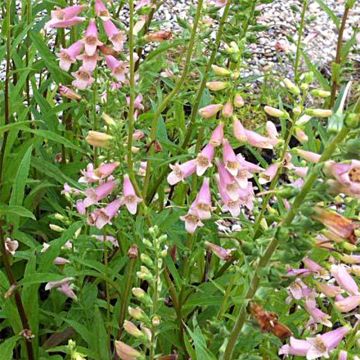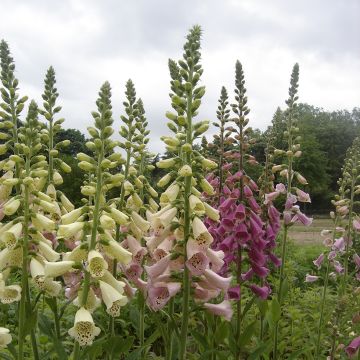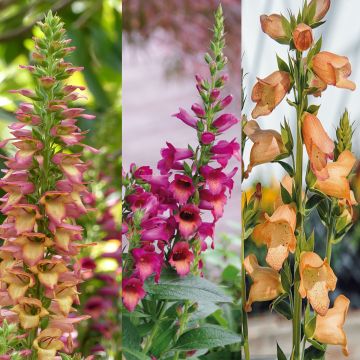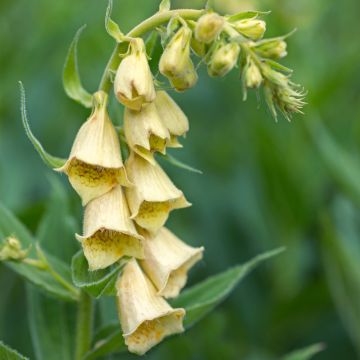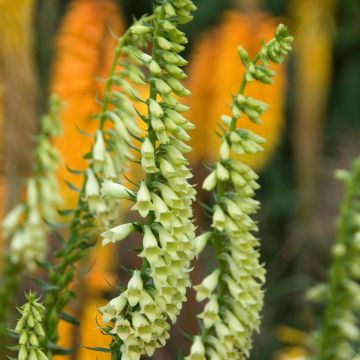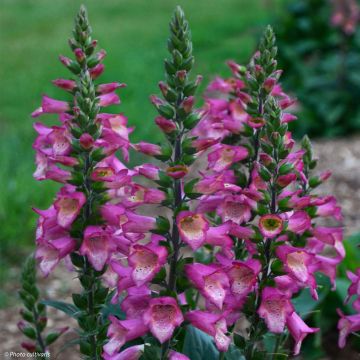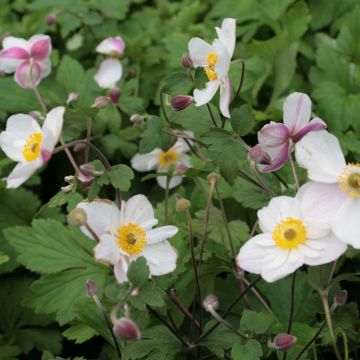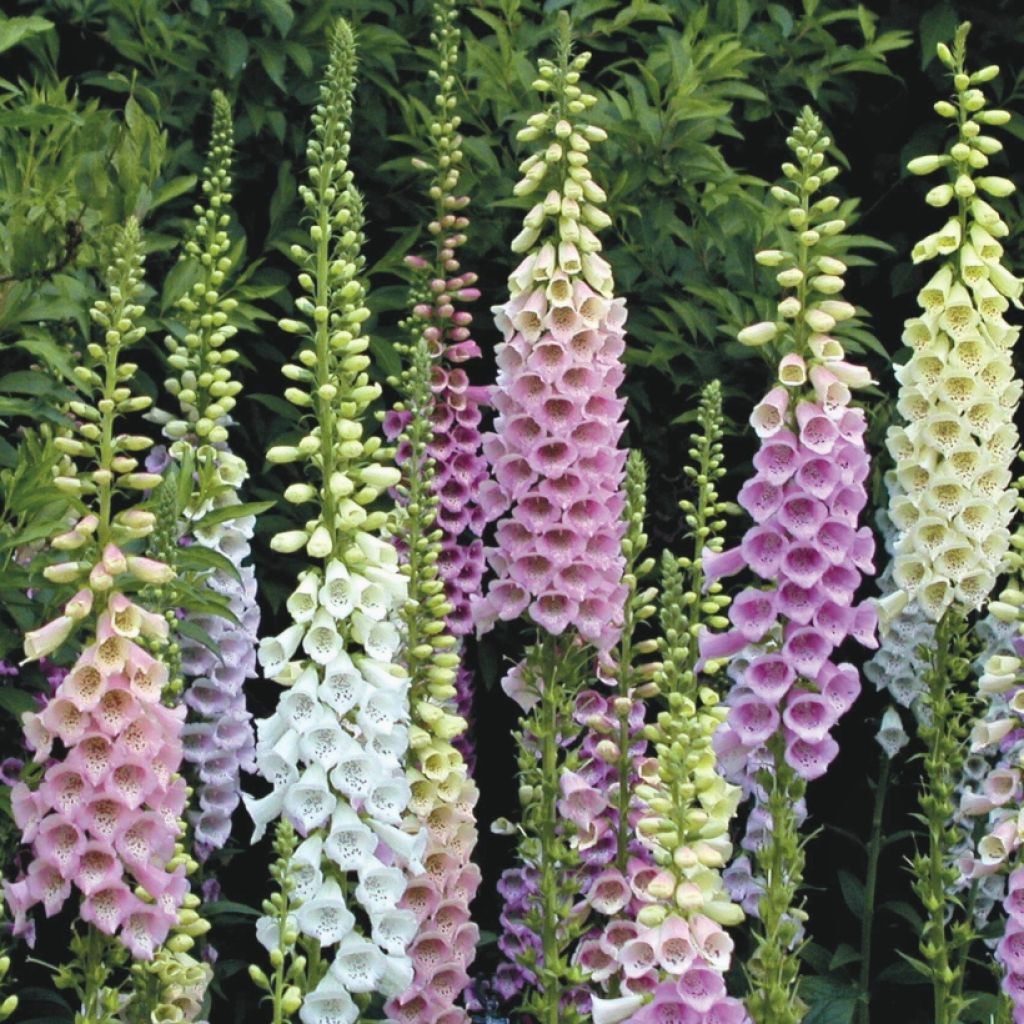

Great value collection of white and pink foxgloves
Great value collection of white and pink foxgloves
digitalis purpurea
This plant carries a 12 months recovery warranty
More information
We guarantee the quality of our plants for a full growing cycle, and will replace at our expense any plant that fails to recover under normal climatic and planting conditions.
From €5.90 for pickup delivery and €6.90 for home delivery
Express home delivery from €8.90.
Delivery to Corse prohibited: UE law prohibits the import of this plant from mainland France to Corse as part of the fight against Xylella fastidiosa. Please accept our sincere apologies.
More information
Does this plant fit my garden?
Set up your Plantfit profile →
Collection items (6 plants)
Description
Our good value White and Pink Digitalis Duo brings together the wild species (Digitalis purpurea) and its white form 'Alba'. These two varieties flower from May to July, in the form of flower spikes rising between 1.2 m and 1.5 m from the ground. Each spike can bear dozens of bell-shaped flowers that open from the bottom up the stem. The large slightly rough basal leaves form a rosette at the base of the plant. This foliage, which persists in winter, contributes to the beauty of the plant. Forming spectacular floral columns, digitalis are irreplaceable in wild or romantic flower beds, in partial shade or non-scorching sun.
This duo consists of:
x 3 Digitalis purpurea: spikes of pink bell-shaped flowers, deep pink, often speckled with darker spots inside.
x 3 Digitalis purpurea 'Alba': this variety is distinguished by its pure white flowers, barely speckled with pale yellow in the throat.
Plant the White and Pink Digitalis Duo in spring or early autumn in well-drained soil rich in humus (or potting soil), not drying out too much in summer. For optimal effect, place the digitalis at the back of flower beds or in the centre of borders, keeping a distance of 40 to 50 cm between each plant. They can also be planted in groups for a stronger visual impact. use 4 to 5 plants per m². Purple digitalis self-seeds spontaneously, without difficulty, without being invasive.
Plant these digitalis with English shrub roses or old roses, add some border bellflowers here and there. Hollyhocks, with their tall flower spikes, can be planted behind the digitalis to add depth to a composition. Pink or white perennial geraniums will form beautiful carpets at the base of the digitalis.
Report an error about the product description
Flowering
Foliage
Plant habit
Safety measures
Botanical data
digitalis
purpurea
Plantaginaceae
Digitalis purpurea var. gloxiniiflora
Western Europe
ingestion
Cette plante est toxique si elle est ingérée volontairement ou involontairement.
Ne la plantez pas là où de jeunes enfants peuvent évoluer, et lavez-vous les mains après l'avoir manipulée.
Pensez à conserver l'étiquette de la plante, à la photographier ou à noter son nom, afin de faciliter le travail des professionnels de santé.
Davantage d'informations sur https://plantes-risque.info
Other Digitalis - Foxglove
Planting and care
Foxgloves can be planted in spring or autumn. These plants prefer partial shade and a neutral to slightly acidic soil, not too chalky, deep, loose and humus-bearing, not too rich and not too dry. They do not mind root competition from old trees or perennials. They are sturdy, very hardy plants, but their lifespan is short. They self-seed abundantly in the garden, but the resulting plants are rarely identical to the parent plants when it comes to horticultural selections. If you do not want the plant to self-seed, cut the flower spikes just after flowering.
Planting period
Intended location
Care
This item has not been reviewed yet - be the first to leave a review about it.
Cottage garden perennials
Haven't found what you were looking for?
Hardiness is the lowest winter temperature a plant can endure without suffering serious damage or even dying. However, hardiness is affected by location (a sheltered area, such as a patio), protection (winter cover) and soil type (hardiness is improved by well-drained soil).

Photo Sharing Terms & Conditions
In order to encourage gardeners to interact and share their experiences, Promesse de fleurs offers various media enabling content to be uploaded onto its Site - in particular via the ‘Photo sharing’ module.
The User agrees to refrain from:
- Posting any content that is illegal, prejudicial, insulting, racist, inciteful to hatred, revisionist, contrary to public decency, that infringes on privacy or on the privacy rights of third parties, in particular the publicity rights of persons and goods, intellectual property rights, or the right to privacy.
- Submitting content on behalf of a third party;
- Impersonate the identity of a third party and/or publish any personal information about a third party;
In general, the User undertakes to refrain from any unethical behaviour.
All Content (in particular text, comments, files, images, photos, videos, creative works, etc.), which may be subject to property or intellectual property rights, image or other private rights, shall remain the property of the User, subject to the limited rights granted by the terms of the licence granted by Promesse de fleurs as stated below. Users are at liberty to publish or not to publish such Content on the Site, notably via the ‘Photo Sharing’ facility, and accept that this Content shall be made public and freely accessible, notably on the Internet.
Users further acknowledge, undertake to have ,and guarantee that they hold all necessary rights and permissions to publish such material on the Site, in particular with regard to the legislation in force pertaining to any privacy, property, intellectual property, image, or contractual rights, or rights of any other nature. By publishing such Content on the Site, Users acknowledge accepting full liability as publishers of the Content within the meaning of the law, and grant Promesse de fleurs, free of charge, an inclusive, worldwide licence for the said Content for the entire duration of its publication, including all reproduction, representation, up/downloading, displaying, performing, transmission, and storage rights.
Users also grant permission for their name to be linked to the Content and accept that this link may not always be made available.
By engaging in posting material, Users consent to their Content becoming automatically accessible on the Internet, in particular on other sites and/or blogs and/or web pages of the Promesse de fleurs site, including in particular social pages and the Promesse de fleurs catalogue.
Users may secure the removal of entrusted content free of charge by issuing a simple request via our contact form.
The flowering period indicated on our website applies to countries and regions located in USDA zone 8 (France, the United Kingdom, Ireland, the Netherlands, etc.)
It will vary according to where you live:
- In zones 9 to 10 (Italy, Spain, Greece, etc.), flowering will occur about 2 to 4 weeks earlier.
- In zones 6 to 7 (Germany, Poland, Slovenia, and lower mountainous regions), flowering will be delayed by 2 to 3 weeks.
- In zone 5 (Central Europe, Scandinavia), blooming will be delayed by 3 to 5 weeks.
In temperate climates, pruning of spring-flowering shrubs (forsythia, spireas, etc.) should be done just after flowering.
Pruning of summer-flowering shrubs (Indian Lilac, Perovskia, etc.) can be done in winter or spring.
In cold regions as well as with frost-sensitive plants, avoid pruning too early when severe frosts may still occur.
The planting period indicated on our website applies to countries and regions located in USDA zone 8 (France, United Kingdom, Ireland, Netherlands).
It will vary according to where you live:
- In Mediterranean zones (Marseille, Madrid, Milan, etc.), autumn and winter are the best planting periods.
- In continental zones (Strasbourg, Munich, Vienna, etc.), delay planting by 2 to 3 weeks in spring and bring it forward by 2 to 4 weeks in autumn.
- In mountainous regions (the Alps, Pyrenees, Carpathians, etc.), it is best to plant in late spring (May-June) or late summer (August-September).
The harvesting period indicated on our website applies to countries and regions in USDA zone 8 (France, England, Ireland, the Netherlands).
In colder areas (Scandinavia, Poland, Austria...) fruit and vegetable harvests are likely to be delayed by 3-4 weeks.
In warmer areas (Italy, Spain, Greece, etc.), harvesting will probably take place earlier, depending on weather conditions.
The sowing periods indicated on our website apply to countries and regions within USDA Zone 8 (France, UK, Ireland, Netherlands).
In colder areas (Scandinavia, Poland, Austria...), delay any outdoor sowing by 3-4 weeks, or sow under glass.
In warmer climes (Italy, Spain, Greece, etc.), bring outdoor sowing forward by a few weeks.




































